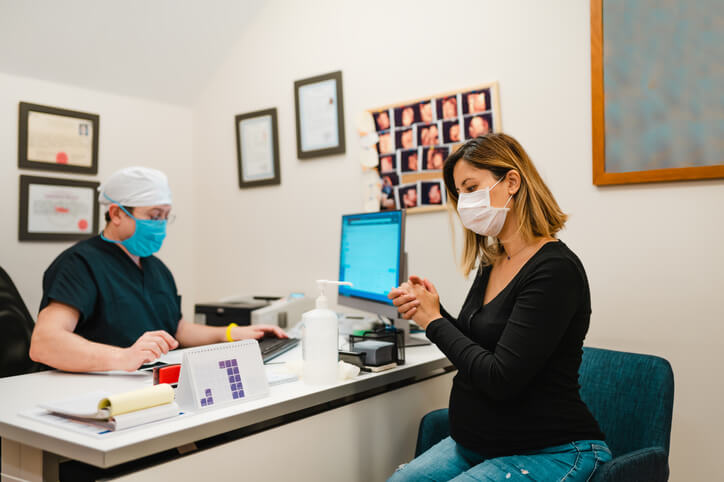On December 16, 2020, the American Society for Reproductive Medicine (ASRM) released a statement for people who are pregnant or who are planning to get pregnant regarding the COVID-19 vaccine. This has significant meaning for gestational surrogates and intended parents, who were previously in a wait-and-see holding pattern.
The statement says that pregnant people, and anyone planning to get pregnant, cango ahead and get vaccinated — as long as your health provider gives you the OK to do so.
Ultimately, you’re free to choose whether or not you get vaccinated. It’s a discussion that intended parents and gestational surrogates should have, along with their American Surrogacy specialist.
If you’re (understandably) nervous about COVID or about getting the COVID-19 vaccine, this guide will help gestational surrogates and intended parents to make a decision on what’s best for them, and for the baby. Please note: You should still talk to your doctor first! They can offer you medical advice based on your individual situation.
COVID-19 Vaccine Basics
Here’s a brief introductory lesson on the COVID-19 vaccine, and some considerations for surrogates and intended parents:
- As you probably know, pregnant women are at a greater risk for becoming seriously sick as a result of COVID-19.
- Two different pharmaceutical companies, Moderna and Pfizer, have produced COVID-19 vaccines — both are about 95% effective. You probably won’t be able to choose which one you receive.
- More vaccines are on the way, and they will also probably be safe for pregnant women.
- The vaccine requires two doses, administered 21-28 days apart, depending on which vaccine you receive.
- You will need to receive both doses of the vaccine in order for it to be effective.
- The first shot is a primer and then the second is a booster shot.
- The vaccine does not contain the live virus itself, and cannot give you COVID-19.
- You will need to continue wearing your mask, practicing good hand-washing and hygiene habits and social distancing even after you’ve received both doses of the vaccine.
- Common side effects include injection site pain, fatigue, headache, muscle and join pain. A handful of people have experienced fevers or allergic reactions. You may want to consider taking a day off to rest up after receiving the booster dose — some recipients say they feel a bit tired and achy for a day or two.
- Vaccine side effects are a sign that your immune system is working as it should, not a sign that a vaccine isn’t working or that something is wrong. However, monitor how you feel after receiving the vaccine, and call your doctor if you’re worried.
- If you’ve had a severe allergic reaction to a vaccine in the past, you should check with your doctor before getting the COVID vaccine.
- Pregnant people were not included in the testing groups for the vaccine, which was why health organizations were initially wary to conclusively state that the vaccine was safe for pregnant women. However, so far there have been no harmful effects for pregnant women or for fetuses, and these organizations have concluded that the likely benefits outweigh the unlikely risks. Because the vaccine does not include the live virus, experts have little reason to believe that the vaccine would be harmful to pregnant women or to unborn babies. But, we understand the lack of data may be too great a worry for you.
- There are still some unknowns, like how long the vaccine protects you, whether it can protect you against an asymptomatic infection, or if you can transmit the virus if you do become infected and are asymptomatic.
Ultimately, when weighing the potential pros and cons, experts say that it’s fine to get the vaccine when it’s available to you. That being said, you should always consult with your doctor before getting vaccinated, especially if you are pregnant or are planning to get pregnant as a gestational surrogate!
Gestational surrogates and intended parents should also talk about the choice to get vaccinated with their American Surrogacy specialist. It’s important for you all to be on the same page.
What the ASRM Says About Pregnancy and the Vaccine
In the statement released December 16 of 2020, the American Society for Reproductive had this to say to anyone who is pregnant (or plans to become pregnant):
- “The Task Force does not recommend withholding the vaccine from patients who are planning to conceive, who are currently pregnant, or who are lactating. These recommendations are in line with those of the Advisory Committee for Immunization Practices (ACIP) of the U.S. Centers for Disease Prevention and Control (CDC), the American College of Obstetricians and Gynecologists (ACOG), and the Society for Maternal-Fetal Medicine (SMFM).”
What that means for you: The general consensus among professionals who are responsible for the health of pregnant women and fetuses is that the vaccine can be administered to surrogates.
- “Patients undergoing fertility treatment and pregnant patients should be encouraged to receive vaccination based on eligibility criteria. Since the vaccine is not a live virus, there is no reason to delay pregnancy attempts because of vaccination administration or to defer treatment until the second dose has been administered.”
What that means for you: Getting vaccinated is still likely safe for surrogates who are currently undergoing, or are planning to undergo fertility treatments, IVF, embryo transfers and pregnancy. It’s also probably safe for intended parents planning to harvest their gametes for the surrogacy journey. Wherever you’re at in your surrogacy journey, that journey will not be affected or delayed if you choose to receive a COVID vaccine.
- “Recent studies have suggested that pregnancy is a risk factor for severe COVID-19 disease. Furthermore, many women who are pregnant or contemplating pregnancy have additional risk factors such as obesity, hypertension or diabetes which may further increase the chance of severe disease from COVID-19 infection. These considerations should be included in decisions regarding vaccination.”
What that means for you: As you probably know, pregnant women have a higher risk of experiencing severe COVID-19 symptoms. This will be a factor in the conversation with your doctor about getting vaccinated.
- “Because COVID-19 mRNA vaccines are not composed of live virus, they are not thought to cause an increased risk of infertility, first or second trimester loss, stillbirth, or congenital anomalies. It should be noted that pregnant and lactating women were excluded from the initial phase III trials of these two vaccines, so specific safety data in these populations are not yet available and further studies are planned. However, the mechanism of action of mRNA vaccines and existing safety data provide reassurance regarding the safety of COVID-19 mRNA vaccines during pregnancy. The FDA EUA letter permits the vaccination of pregnant and breastfeeding individuals with a requirement that the company engage in post-authorization observational studies in pregnancy.”
What that means for you: Even though pregnant women weren’t included in the original trials of the vaccine, this type of vaccine has been extensively studied and is generally considered safe for pregnant women and for the pregnancy itself. However, we understand the lack of data may give you pause.
- “While COVID-19 vaccination can cause fever in some patients (up to 16% of those vaccinated and mostly after the second dose), this risk should not be a concern when deciding whether to vaccinate a pregnant individual or a patient desiring pregnancy. While fever in pregnancy (particularly the 1st trimester) has been associated with an increased risk of neural tube defects, a recent study demonstrated the association no longer remained significant if the patient is taking >400 mcg of folic acid daily. Another large Danish cohort study did not demonstrate any increased risk of congenital anomalies of those who reported fever in the first trimester. Additionally, the most common symptom of COVID-19 infection itself is fever (83-99% of affected patients). Patients who experience fever following vaccination should take an antipyretic medication, like acetaminophen.”
What that means for you: Even if a gestational surrogate experiences vaccine side effects like a fever, it shouldn’t harm the surrogate or the pregnancy, especially if you’re taking your recommended folic acid.
- “Patients who conceive in the window between the first and second dose of the vaccine should be offered the second dose of the vaccine at the appropriate interval.”
What that means for you: It’s OK if you become pregnant in between your first and second dose. Go ahead and get your second vaccine dose as scheduled.
- “Physicians should promote vaccination to patients, their communities, and to the public. Preliminary data suggests that those populations at greatest risk of severe disease from COVID-19 may also be the most hesitant to be vaccinated, and specific efforts to increase vaccine uptake in these communities should be undertaken.”
What that means for you: We know you’re worried about the health and safety of this pregnancy, as well as your own safety. But, after checking in with your doctor, you’re free to schedule your COVID vaccine as soon as it’s available to you. The benefits may outweigh the risks.
What American Surrogacy Recommends
We know that if you’re a gestational surrogate or an intended parent, or if you’re thinking about starting your surrogacy journey as a surrogate or parent, you’re probably worried about how COVID-19 affects your surrogacy journey. During a surrogacy journey, the gestational surrogate and intended parents worry about everything that goes into the surrogate’s body — everyone’s priority is the health and safety of the surrogate and baby.
With that top priority in mind, and with the recommendations of trusted health organizations, American Surrogacy joins in recommending that gestational surrogates can receive the COVID-19 vaccine, as long as the surrogate, the intended parents and the surrogate’s doctor are all comfortable with this. However, a COVID-19 vaccine is not currently required for our surrogates — the decision to receive the vaccine is still at the discretion of the surrogate, the intended parents and the surrogate’s doctor.
Wherever you’re currently at in your surrogacy journey, we suggest speaking to your doctor about getting vaccinated. Ask your doctor when a COVID-19 vaccine might be available to you, and ask if they think you might have any health conditions or risk factors that would make the vaccine inadvisable in your situation.
As long as your doctor and your surrogacy partners agree with this choice, you’re free to get the vaccine when it’s available to you. But, when in doubt, consult your American Surrogacy specialist!
To stay up to date with surrogacy advice, check in with our Instagram!









